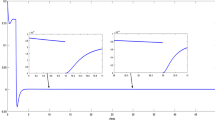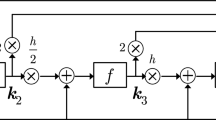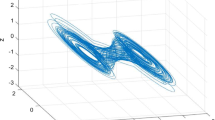Abstract
This paper addresses the global exponential dissipativity (GED) of impulsive recurrent neural networks (IRNNs) with proportional delays. By introducing some adjustable parameters, skillfully designing several Lyapunov functionals and utilizing matrix norm properties, serval delay-dependent GED criteria are developed, and global attractive sets (GAS) and global exponential attractive sets (GEAS) of the proposed system are given. These adjustable parameters are related to the exponential decay rate and contribute greatly to expand the attractive sets of this paper. Here the criteria proposed improve and extend the earlier global dissipativity criteria. Several numerical examples are used to verify the obtained results and show that the obtained results are independent of each other.





Similar content being viewed by others
References
Ockendon JR, Tayler AB (1971) The dynamics of a current collection system for an electric locomotive. P Roy Soc Lond A 332(2):447–468
Iserles A (1993) On the generalized pantograph functional differential equation. Eur J Appl Math 4(1):1–38
Liu YK (1996) Asymptotic behavior of functional differential equations with proportional time delays. Eur J Appl Math 7(1):11–30
Yzbasl S (2014) Laguerre approach for solving pantograph-type Volterra integro-differential equations. Appl Math Comput 232:1183–1199
Ezz-Eldien SS (2018) On solving systems of multi-pantograph equations via spectral tau method. Appl Math Comput 321:63–73
Chen Z, Gou Q (2019) Piecewise Picard iteration method for solving nonlinear fractional differential equation with proportional delays. Appl Math Comput 348:465–478
Sader M, Abdurahman A, Jiang H (2019) General decay lag synchronization for competitive neural networks with constant delays. Neural Process Lett 50:445–457
Kashkynbayev A, Cao J, Damiyev Z (2019) Stability analysis for periodic solutions of fuzzy shunting inhibitory CNNs with delays. Adv Differ Equ 1:1–19
Liu P, Kong M, Xu M, Sun J, Liu N (2020) Pinning synchronization of coupled fractional-order time-varying delayed neural networks with arbitrary fixed topology. Neurocomputing 400:46–52
Sun B, Wang S, Cao Y, Guo Z, Huang T, Wen S (2020) Exponential synchronization of memristive neural networks with time-varying delays via quantized sliding-mode control. Neural Netw 126:163–169
Tian Y, Wang Z (2020) \(H_{\infty }\) performance state estimation for static neural networks with time-varying delays via two improved inequalities. IEEE Trans Circuit Systs-II. https://doi.org/10.1109/TCSII.2020.2995604
Tian Y, Wang Z (2021) A new result on \(H_{\infty }\) performance state estimation for static neural networks with time-varying delays. Appl Math Comput 388:125556
Chen G, Li D, Shi L, Gaans OV, Lunel SV (2018) Stability results for stochastic delayed recurrent neural networks with discrete and distributed delays. J Differ Equ 264(6):3864–3898
Zhou L, Zhang Y (2016) Global exponential stability of a class of impulsive recurrent neural networks with proportional delays via fixed point theory. J Frankl Inst 353(2):561–575
Zhou L (2018) Delay-dependent and delay-independent passivity of a class of recurrent neural networks with impulse and multi-proportional delays. Neurcomputing 308:235–244
Guan K (2019) Global power stability of neural networks with impulses and proportional Delays. B Malays Math SCI SO 42(5):2237–2264
Zhou L, Zhao Z (2020) Exponential synchronization and polynomial synchronization of recurrent neural networks with and without proportional delays. Neurocomputing 372(1):109–116
Zhou L, Zhao Z (2020) Asymptotic stability and polynomial stability of impulsive Cohen–Grossberg neural networks with multi-proportional delays. Neural Process Lett 51(3):2607–2627
Feng Z, Lam J (2011) Stability and dissipativity analysis of distributed delay cellular neural networks. IEEE Trans Neural Netw 22(6):976–981
Wu Z, Lam J, Su H, Chu J (2012) Stability and dissipativity analysis of static neural networks with time delay. IEEE Trans Neural Netw Learn Syst 23(2):199–210
Guo Z, Wang J, Yan Z (2013) Global exponential dissipativity and stabilization of memristor-based recurrent neural networks with time-varying delays. Neural Netw 48:158–172
Zeng H, Park JH, Xia J (2015) Further results on dissipativity analysis of neural networks with time-varying delay and randomly occuring uncertainties. Nonlinear Dyn 79:83–91
Nagamani G, Radhika T (2016) Dissipativity and passivity analysis of Markovian jump neural networks with two additive time-varying delays. Neural Process Lett 44(2):571–592
Tu Z, Cao J, Alsaedi A, Hayatce T (2017) Global dissipativity analysis for delayed quaternion-valued neural networks. Neural Netw 89:97–104
Zhang G, Zeng Z, Hu J (2018) New results on global exponential dissipativity analysis of memristive inertial neural networks with distributed time-varying delays. Neural Netw 97:183–191
Saravanakumar R, Rajchakit G, Syed Ali M, Joo YH (2019) Exponential dissipativity criteria for generalized BAM neural networks with variable delays. Neural Comput Appl 31(7):2717–2726
Tian Y, Wang Z (2020) Extended dissipativity analysis for Markovian jump neural networks via double integral-based delay-product-type Lyapunov functional. IEEE Trans Neural Netw Learn Syst. https://doi.org/10.1109/TNNLS.2020.3008691
Popa C (2020) Dissipativity of impulsive matrix-valued neural networks with leakage delay and mixed delays. Neurocomputing 405:85–95
Zhou L (2013) Dissipativity of a class of cellular neural networks with proportional delays. Nonlinear Dyn 73(3):1895–1903
Li N, Cao J (2018) Global dissipativity analysis of quaternion-valued memristor-based neural networks with proportional delay. Neurocomputing 321:103–113
Li H, Li C, Zhang W, Xu J (2018) Global dissipativity of inertial neural networks with proportional delay via new generalized Halanay inequalities. Neural Process Lett 48(3):1543–1561
Aouiti C, Sakthivel R, Touati F (2020) Global dissipativity of fuzzy cellular neural networks with inertial term and proportional delays. Int J Syst Sci 51(8):1392–1405
Xing L, Zhou L (2020) Polynomial dissipativity of proportional delayed BAM neural networks. Int J Biomath 13(6):2050050
Li CD, Li CJ, Liu C (2009) Destabilizing effects of impulse in delayed BAM neural networks. Modern Phys Lett B 23(29):3503–3513
Tan J, Li C (2017) Finite-time stability of neural networks with impulse effects and time-varying delay. Neural Process Lett 46(1):29–39
Zhang W, Qi J, He X (2018) Input-to-state stability of impulsive inertial memristive neural networks with time-varying delayed. J Frankl Inst 355(17):8971–8988
Aouiti C, Assali EA (2019) Stability analysis for a class of impulsive high-order Hopfield neural networks with leakage time-varying delays. Neural Comput Appl 31(11):7781–7803
Acknowledgements
This work is supported by the National Science Foundation of Tianjin (No. 18JCYBJC85800) and the Innovative Talents Cultivation of Young Middle Aged Backbone Teachers of Tianjin (No. 135205GC38).
Author information
Authors and Affiliations
Corresponding author
Additional information
Publisher's Note
Springer Nature remains neutral with regard to jurisdictional claims in published maps and institutional affiliations.
Rights and permissions
About this article
Cite this article
Zhou, L. Global Exponential Dissipativity of Impulsive Recurrent Neural Networks with Multi-proportional Delays. Neural Process Lett 53, 1435–1452 (2021). https://doi.org/10.1007/s11063-021-10451-8
Accepted:
Published:
Issue Date:
DOI: https://doi.org/10.1007/s11063-021-10451-8




